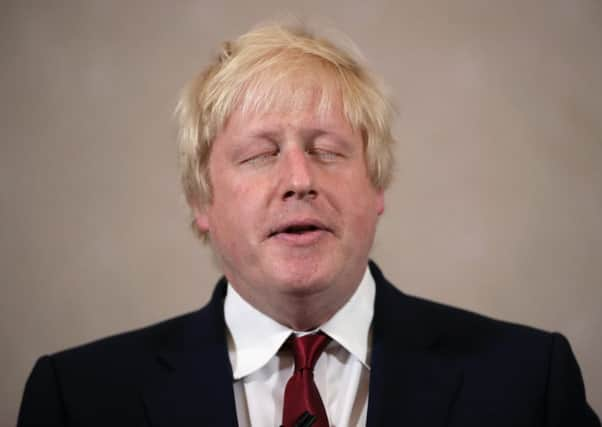Leaders: Boris springs fresh post-Brexit shocks


And the shocks delivered by the EU referendum just keep coming. Right up until the last minute, ex-London mayor Boris Johnson was tipped as the front-runner in the Tory race to be the next Prime Minister. But then, in what was expected to be his “I’m standing” speech he instead ruled himself out.
The surprise move had all the tell-tales of being a last-minute decision, in fact so last-minute that it sounded like he did deliver his “I’m standing” speech but changed the end.
Advertisement
Hide AdAdvertisement
Hide AdJohnson was without doubt the populist face of the Leave campaign, the man who mobilized the masses, and there will be many Leave voters who will feel cheated that Johnson will not now provide the leadership he promised during the campaign. There will also be many Remain voters angry that a man who played such a large part will not be around to deal with the many and far-ranging consequences of his actions.
At the outset of the EU referendum campaign it was widely said that Boris had decided to lead the Leave campaign purely to further his ambition to be Prime Minister, that it was a long shot but a clear opportunity. There is even a conspiracy theory that he led the Leave campaign in the expectation it would lose but he would have gathered a lot of grass roots support and that would put him in a stronger position for an old fashioned leadership ascent.
But that did not happen, and his ambition to become prime minister appears in tatters and destined to remain unfulfilled. How did referendum success come to this? Michael Gove is painted as the pantomime villain, treacherously stabbing Johnson in the back. Some say he saw his opportunity and decided to go for it, others that this was his plan all along. Machiavellian indeed.
But Mr Gove’s actions virtually hand the job to Theresa May. There will be some who say if he does lose he will be rewarded with a plum job and that might form part of his thinking. His treatment of Johnson means he is unlikely to succeed Cameron.
In the aftermath of the Brexit vote there were many who said this was another example of the public demonstrating a deep need for change and the strongest signal yet of disillusionment with the political establishment, after Donald Trump’s success in the US and the election of Jeremy Corbyn as Labour leader against the wishes of Labour MPs.
If that is the case then there must be disappointment that Johnson has had to go, because despite his incredibly privileged background he was seen as different from the rest and as a breath of fresh air – he was a change candidate.
But now the Tory party seems to be heading straight for a candidate from the old bunch, with the real fights behind closed doors featuring shady deals and alliances and the public without a clue as to why we are where we are. It appears the Tory party anyway have learnt nothing from the public’s loud demands for a change in the old ways and reform of the system.
Memory is the greatest tribute
Europe 100 years ago; the bloodiest day in British military history. The battle of the Somme was a joint British and French push against the German forces in the third year of the Great War.
Advertisement
Hide AdAdvertisement
Hide AdIt is now regarded the most potent symbol of the futility of war. The point where the technology of killing had so outstripped the thinking of military strategists that the capacity for the huge scale of slaughter had just not been contemplated.
Overall the battle saw one million soldiers from all sides either killed, wounded or taken prisoner.
The Allied artillery barrage, the likes of which the British had never delivered before, completely failed against well-prepared defences, and the bodies of the British did not fare well against the wall of machine gun fire that came their way as they advanced. The bloodshed saw 57,000 British soldiers killed or wounded in the first day.
It is hard to overestimate the impact the First World War had on the people of the countries who fought. For a clear and tragic insight it is probably best to visit any one of the hundreds of war memorials in Scottish villages that mark the deaths of people who largely worked the land around scattered hamlets and see how many of the fallen from those small communities carried the same surname. Fathers and sons, brothers and uncles, families ripped apart, communities shattered.
Now, post both world wars, it is almost unthinkable that it could happen again. That sort of mass warfare will hopefully never return to visit its horror, and one of the ways we can both pay tribute to the sacrifices made and ensure they were not futile is to remember.